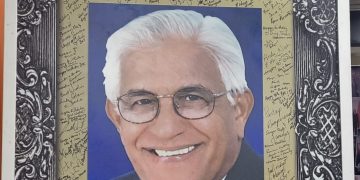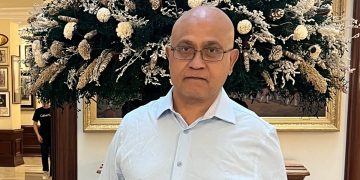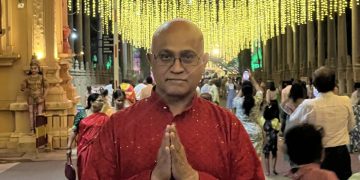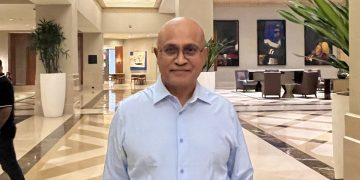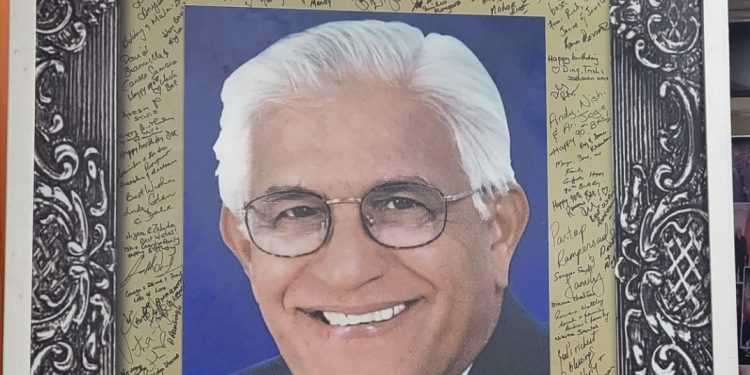Basdeo Panday died on New Year’s Day at a Jacksonville, Florida, hospital. Tributes have poured in about this very colorful character who was a lawyer, politician, trade unionist, economist, actor, Indian musician (instrumentalist) and who also briefly served as a government civil servant and a teacher and also employed as a clerk in London. He was also a clerk for several judges including Noor Hassanali who subsequently became President of T&T including under Panday’s tenure as Prime Minister. He is well known among Guyanese (and others throughout the Caribbean region) at home and in the diaspora because he mingled and socialized among them, visiting Guyana multiple times going back to the 1970s.
Panday, or Bas as we called him, had a long association with Guyanese and with Cheddi Jagan as he related to me in numerous conversations at his home, office, New York, Guyana, India, and elsewhere. He met Cheddi in Trinidad after the suspension of the 1953 government and a few times after that before Panday flew off to London to further his studies in 1957 when democratic governance was restored in British Guiana and Cheddi’s PPP won the elections becoming Premier. Cheddi visited Trinidad several times addressing audiences around the island to round up support for restoration of self-governance and met prominent political and cultural individuals. Panday went to meetings listening to Cheddi.
Panday would study with Guyanese in England during the late 1950s and early 1960s, particularly during his law studies at Inns Court of Law where countless Guyanese and Trinis as well as other West Indians did their law degree. Like so many Guyanese and other West Indians, he became a member of Lincoln’s Inn and was called to the bar. (Panday also studied Economics obtaining a BS from University of London). In 1965, Panday was awarded a Commonwealth scholarship to pursue a PhD at the prestigious Delhi School of Economics. He decided to return home first and visit his family. He got caught up in local politics, culture, and family life and forego the scholarship. He ran for office and was resoundingly defeated as a candidate for the Workers and Farmers Party in 1966. He would become a Senator in 1972 and won a seat as a ULF candidate to the House in 1976.
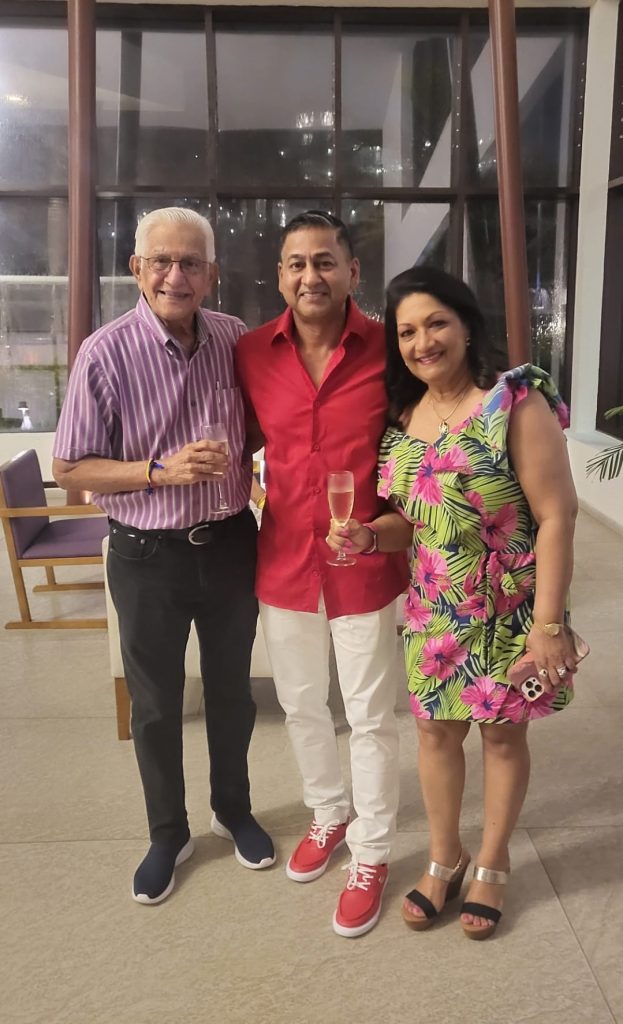 Panday’s association with Guyanese grew after 1966. He would become close to Cheddi especially after the 1968 election rigging. Cheddi visited Trinidad regularly seeking support for free and fair election having meetings in Tunapuna, St. Augustine, and South Trinidad. In 1977, a group of (Indian) Guyanese and Trinis formed an organization (Indo Club) in New York to combat racial discrimination against Indians in the Caribbean, among other purposes. On behalf of the group, at Vassan Ramracha’s urging, I communicated during 1978 with Panday who had become Opposition Leader (and leader of the United Labor Front), seeking the opposition support for our struggle for free and fair elections. The PNM government had backed the Burnham administration and Panday the PPP. (The Trinidad opposition MPs had a split on who should be Leader of the Opposition, but Panday held a narrow majority over Raffique Shah). Panday, who was also leader of the sugar workers union, was invited to Guyana by Dr Nanda Gopaul in late 1970s and addressed the NAACIE labor conference in Georgetown. He visited Guyana several times thereafter. He also visited New York at our invitation and our group met him many times discussing Guyanese and Trinidadian politics. At our urging, he raised the issue of rigged elections in Guyana in T&T Parliament during the late 1970s but was blanked by the William’s administration that supported Forbes Burnham. Panday sought our assistance for his party in Trinidad, and he received our help that included a group of us traveling down to Trinidad and campaigning for his party in the 1981 elections. Panday was very warm towards me when I visited in August 1981 as well as with Vassan and his brother Rennie, both of who campaigned for the party, including for Trevor Sudama who contested in Oropouche and Kelvin Ramnath who contested from Couva South; Panday contested from Couva North. Rennie, a NYU trained political scientist, was offered to contest a seat, but he declined.
Panday’s association with Guyanese grew after 1966. He would become close to Cheddi especially after the 1968 election rigging. Cheddi visited Trinidad regularly seeking support for free and fair election having meetings in Tunapuna, St. Augustine, and South Trinidad. In 1977, a group of (Indian) Guyanese and Trinis formed an organization (Indo Club) in New York to combat racial discrimination against Indians in the Caribbean, among other purposes. On behalf of the group, at Vassan Ramracha’s urging, I communicated during 1978 with Panday who had become Opposition Leader (and leader of the United Labor Front), seeking the opposition support for our struggle for free and fair elections. The PNM government had backed the Burnham administration and Panday the PPP. (The Trinidad opposition MPs had a split on who should be Leader of the Opposition, but Panday held a narrow majority over Raffique Shah). Panday, who was also leader of the sugar workers union, was invited to Guyana by Dr Nanda Gopaul in late 1970s and addressed the NAACIE labor conference in Georgetown. He visited Guyana several times thereafter. He also visited New York at our invitation and our group met him many times discussing Guyanese and Trinidadian politics. At our urging, he raised the issue of rigged elections in Guyana in T&T Parliament during the late 1970s but was blanked by the William’s administration that supported Forbes Burnham. Panday sought our assistance for his party in Trinidad, and he received our help that included a group of us traveling down to Trinidad and campaigning for his party in the 1981 elections. Panday was very warm towards me when I visited in August 1981 as well as with Vassan and his brother Rennie, both of who campaigned for the party, including for Trevor Sudama who contested in Oropouche and Kelvin Ramnath who contested from Couva South; Panday contested from Couva North. Rennie, a NYU trained political scientist, was offered to contest a seat, but he declined.
During the late 1970s, (Indian) Guyanese would migrate to Trinidad in search of better economic opportunities; in a racially polarized society, they naturally gravitated towards Panday’s Indian supported party ULF and other rre-incarnations. Panday’s newly formed Trinidad and Tobago Alliance (with Lloyd Best’s Tapia House and ANR Robinson’s DAC of Tobago) was resoundingly defeated. During the new parliament (1981-86), at Opposition Leader Panday’s behest, Trevor Sudama and Kelvin Ramnath would regularly raise the issue of fraudulent elections and human rights violations in Guyana. The opposition also called for regularization of status and amnesty for Guyanese living illegally in Trinidad. He spoke out against the abuse of Guyanese, particularly Indian females, in Trinidad and their harassment at Piarco. But the Panday led opposition as usual was ignored by the PNM government.
Engagements with Panday about Guyana continued on the phone and mails with our group and in meetings during his visits to New York and our visits to Trinidad post 1981. He continued his support for our struggle for restoration of democracy in Guyana. He sought our views on teaming up with other political parties to combat the PNM in general elections in 1986. We support the formation of an alliance (NAR) with other parties but with him as political leader. He rejected our advice. Panday unwisely yielded the leadership of NAR to ANR Robinson (who had only two seats in his Tobago base). Panday appealed for resources from our NY group and we responded positively. Narine Singh, Robin Parray, Mike Sims, and others contributed significantly to the campaign. The NAR won the December 1986 elections and Panday would be appointed Minister of Foreign Affairs and International Trade. As promised to us, Panday piloted amnesty and legalized status for Guyanese and other undocumented in Trinidad and Tobago in 1987. Panday also traveled to Guyana several times as Foreign Minister and called for FFE. He met Cheddi and other stalwarts involved in the struggle. Soon, frictions developed in the coalition with Panday affiliated MPs marginalized and their constituencies were starved of resources. Panday spoke out against Indian neglect and also against Robinson’s reluctance to speak out against rigged elections and human rights violations in Guyana; NAR MPs backpedaled on a commitment they made with us (including Ravi Dev’s and Depoo’s group UDM) in NY to assist in our struggle for restoration of democracy in Guyana.
Panday (and Oma) visited New York in September 1987 for the UN General Assembly Session and met a group of us including Trinidadians Narine Singh and Robin Parray of Club Regal (Brooklyn), both involved in the struggle for free and fair elections in Guyana; Kelvin Ramnath (and wife Golly) was also there. The discussion focused on marginalization of Indians in Trinidad and FFE in Guyana. There was also a follow up luncheon we hosted with Panday, Oma, Narine, Vassan, Franke Ramadhar, myself and my wife Parbatie and a few others at Bombay Palace in Manhattan (don’t recall if Bhanu Dwarika was also there). Panday committed to intensify the struggle for racial and working class equality in T&T and for restoration of democracy in Guyana.
On returning to Trinidad, amidst protestations against marginalization of Indo-Trinidadians, Panday was told to take his “ten Indian seats and go”. He became more emboldened to speak out against racial discrimination. Robinson expelled Panday and several other Ministers and MPs affiliated with Panday. They sat in the opposition. The President (Noorhassanali) appointed Panday as Opposition Leader, replacing Patrick Manning in 1988. Panday continued championing the cause of free and fair elections in Guyana. He (and Cheddi) were invited to and delivered keynote address on different days at our Global conference on Indians in the diaspora at Columbia University in July 1988. They duo would also meet again in August 1989 at the global convention of PIOs in NY. In conversations I had with Cheddi in NY, he complained that Panday was not left enough and that he should join the international movement against imperialism. Panday remained a centrist but was laborite who championed the working class.
Panday and opposition MPs were invited by Narine (and other Trinis) and our (Guyanese) group to meet in New York to discuss their political future. Narine and a few others funded the trip. Our advice was to form a new political party. Club 88 got endorsement from a massive rally at Aranguez Savannah amidst torrential rainfall in 1989 to form a political party. Club 88 was transformed into a political party and contested elections in 1991. NAR was crushed reducing it from 33 seats in 1986 to a mere two in 1991. Manning became PM and Panday Opposition Leader. Facing international political pressure including from Trinidad and Caribbean leaders, Desmond Hoyte agreed to hold free and fair elections in October 1992 under international observers. The PPP won and Manning was present at the swearing in. But President Cheddi and Panday would meet several times. Several fundraisers were held by Guyanese New Yorkers for Panday’s UNC after 1991 and continuing till 2010; Kawal Totaram, Herman Singh, Jass Persaud, George Sobhraj, Ritchie Singh, Rishi Anderson), among others was part of those fundraisers in which hundreds of thousands of American dollars were raised for the UNC over the years. With Ramesh Lawrence Maharaj on his side as Opposition Whip on strategy, the UNC’s base and support expanded and would tie the PNM (17 seats) in the 1995 elections, forming a coalition government with Robinson’s two seats. One of Panday’s earliest acts was cancellation of tens of millions of dollars in debt owed by Guyana. He traveled to Guyana as PM meeting Cheddi. He also was host of Caricom meeting at the Hilton in Trinidad where Guyanese leaders were present.
In NY, Panday was treated like an honorary Guyanese wherever he went visiting mandirs, clubs, restaurants and public events in NY as Opposition Leader and as PM including when he came in September 1996 and in subsequent trips. Panday would attend the state funeral of Cheddi who died in March 1997, spending several days and even traveling to Corentyne for the cremation and staying at Albion Estate. He would win re-election in December 2000; his government would collapse in 2001 in a fallout with Maharaj. He called snap elections in December 2001 and was tied (18 seats) with PNM. Panday signed a letter authorizing Robinson to choose the PM. Robinson chose Manning. Panday would not be able to make a comeback remaining opposition Leader till 2010 when he was defeated for party leadership by Kamla Persad Bissessar. He and Maharaj were not offered a seat in the new dispensation and was out of the parliament for the first time since 1972. He would meet Presidents Sam Hinds, Janet Jagan, Bharrat Jagdeo, Donald Ramotar, and Irfaan Ali. Post 2010, Panday continued his association with Guyanese. He made regular trips to Guyana and meeting the diapsora in NY; he has many friends in Guyana and he was in Guyana early last year. I am certain many Guyanese would attend his funeral. (As an aside, Panday was gracious and warm towards me, taking my calls as Opposition Leader and as PM. I visited his private Philippines home and PM’s office announced and un-announced one time with Deo and Tara Gosine. He knew Deo and Tara (a Guyanese) very well. Panday was also hosted as speaker at several functions organized by Guyanese in NY including by GOPIO when Berbician Ashook Ramsaran was President. Deo, Ashook, and myself succeeded in reconciling Panday and Ramesh Maharaj at a PBD reception in Mumbai in January 2005 at the Taj Palace hotel. The duo committed to renewing their political affiliation with Maharaj returning to contest a seat in 2007 and crushing the COP.
Throughout his life especially post 1953, Panday was interested in Guyanese politics and he lent support for democratic governance in Guyana. He also was a cricket enthusiast and cheered Rohan Kanhai, Alvin Kalicharran, Chandrapaul and other Guyanese cricketers playing at Queens Park. He was also very fond of local classical and chatney singing. He attended several concerts where Guyanese entertained audiences in Trinidad, Guyana, New York and other locations.
He would be remembered by Guyanese for his contributions to the struggle for FFE and for his socializing with Guyanese who developed a likeness for him.
Panday would meet and develop a very close friendship with Guyanese Nohar Singh (uncertain of date); they and Oma developed a strong bond. Ditto Trinidadian Narine Singh. Both Nohar and Narine hosted Panday and his wife Oma at their homes at different times from the late 1980s onwards and including recently when Panday and Oma visited the Big Apple as guests of Nohar. Panday and Oma were also at several programs hosted by Nohar in Guyana and at Travel Span tours around the region including last year in Punta Cana.
(As an aside, I was never turned away by Panday or Oma and even his daughter was always gracious in their encounters with me. When I phoned his PM office several times, the secretary would ask what were the calls about and I would respond personal and she passed it on to the PM. Panday accepted the call and would say come by. I never really needed an invitation to visit the PM’s home when Panday was PM. And I attended several functions and private dinners, breakfasts and lunches there.)
